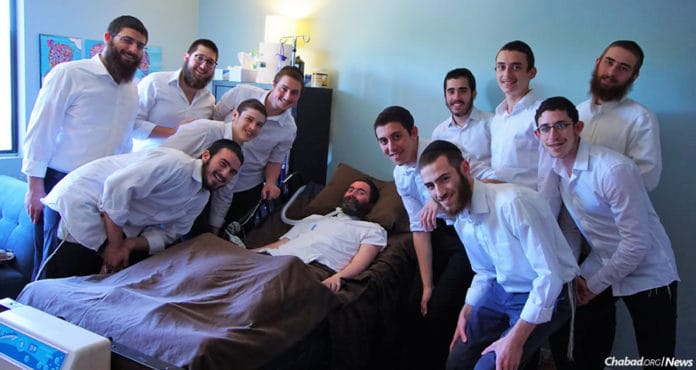

Rabbi Yitzi Hurwitz is about to turn 46. As a little boy in Brooklyn, N.Y., he loved dancing, singing and making people laugh. As a Chabad-Lubavitch emissary to Temecula, Calif., he used those gifts to teach and inspire others, as he and his wife, Dina, built a vibrant and loving community.
According to Dina Hurwitz, one of the most beloved aspects of her husband’s work was putting on tefillin with men in his community and encouraging them to purchase their own sets so they could do so themselves regularly.
“He loves his tefillin, and it was his passion to put them on with other people,” she tells Chabad.org. “When he turned 40, I bought him a new pouch for his tefillin. It is a mitzvah I know he loves, and if I could make it more beautiful for him, that would be the perfect gift.”


So much began to change so quickly five years ago, when the rabbi was diagnosed with ALS (known as Lou Gehrig’s disease), which has gradually robbed him of the ability to walk, speak or even move.
In the years since his diagnosis, the father of seven has become a bastion of inspiration to millions worldwide, through his uplifting, transformative (and always optimistic) writings on Chabad.org, his musical compositions, and through the bright smiles he still shares with his many visitors and students in his apartment in Los Angeles, where he now lives.


Friday is his 46th birthday, and a group of students in the nearby Chabad-Lubavitch yeshivah, Ohr Elchanan Chabad—whose lives are profoundly touched by their daily praying, singing and learning interactions with Rabbi Yitzi, as he is universally known—thought long and hard about what they could do for their beloved mentor and friend’s birthday.
They knew that for Rabbi Yitzi, a man of action, it had to be something tangible, something that would have a lasting impact on people’s lives. They had also just completed learning about the special meaning of a Jewish birthday and the responsibility to celebrate it in a spiritual fashion, as explained by the Rebbe—Rabbi Menachem M. Schneerson, of righteous memory—almost exactly 30 years ago.


The students finally came up with an idea last week: An international day of laying tefillin—wherein Jewish men of all walks of life would don the head and heart tefillin, say a prayer for themselves and a prayer for Rabbi Yitzi, and synchronize their heads and hearts in fulfillment of the biblical command for Jewish men—would be the absolutely most joyous thing for Rabbi Yitzi, especially if it helped some people go out of their comfort zones.
Something similar had been done five years before, but on a smaller scale.
Just months after the rabbi’s diagnosis, as the Hurwitzes were preparing to celebrate the bar mitzvah of their son Eli Chaim, 12 men in their community purchased tefillinand made a commitment to their beloved rabbi that they would put them on every day, giving the family something the rabbi described at the time as “the ultimate bar mitzvah gift.”


Now, five years later, using every means at their disposal—social media, email, telephone and old-fashioned word of mouth—the yeshivah students are pushing the idea to their peers and contacts all over the world.
“Rabbi Yitzi inspires so many with joy, faith and optimism, teaching everyone how to get in touch with their souls, how to be happy with what we have, how G‑d gives us the ability to overcome extraordinary odds, and so much more,” the Los Angeles students wrote to their friends.
“Now that he cannot actually go out and put on tefillin with others as he loved to do, we must be there for him to actually go out and put on tefillin with others as he loved to do . . . Let’s do it for him!”
And the idea has grown in momentum.
Yeshivah students, rabbis and lay people will approach many thousands of Jewish men who do not put on tefillin daily, all over the globe, and offer them the opportunity to participate in the tefillincampaign launched by the Rebbe more than 50 years ago to foster deeper connection to G‑d.
In a cumulative demonstration of global prayer and interconnectivity, each participant will strap on their respective head and arm tefillin boxes, recite the prayers, and meditate about their relationship with G‑d—and then upload their pictures to social media proclaiming #TefillinForYitzi.
In Stamford, Conn., Los Angeles yeshivah student Leibel Shmotkin’s mother mentioned the idea to her friend Robin Fischel, who in turn urged her husband, Jason, to don his tefillin in Rabbi Yitzi’s honor. The Fischels are now busily spreading the word on their networks.
“To think that this rabbi, who doesn’t know me or my husband from a hole in the wall, is sitting in an unimaginable jail of sorts,” says Robin Fischel, “and yet cares about nothing more than the spiritual well-being of his brethren Jews worldwide—so much so that this is understood by his family and friends to be the best present he could possibly receive for his birthday—moves me beyond words. The least I could do is help spread his birthday wish, which is truly a wish for us.”
Rabbi Yitzi Hurwitz is able to communicate only by writing through eye movements, and described his delight at hearing about the campaign in a message to Chabad.org:
“I am so grateful to every person who is part of this tefillin campaign in honor of my birthday,” wrote the rabbi. “It is an amazing gift. This mitzvah is so important to me, and it gives me so much pleasure that you are doing this in my merit. May your efforts be crowned with success, and may each and every one of you be blessed in all areas of your lives. Thank you so much!”


To join in the initiative:
● Put on tefillin and/or enable a fellow Jewish man to do the same
● Take a picture with a #TefillinForYitzi placard
● Share your picture on social media with the hashtags #TefillinForYitzi and #ShineALittleLight and submit it via email to ([email protected]); on WhatsApp (323-736-7812); or by text message (770-810-5134) for collection and presentation to Rabbi Yitzi Hurwitz on his birthday.
The content in this page is produced by Chabad.org, and is copyrighted by the author and/or Chabad.org. If you enjoyed this article, we encourage you to distribute it further, provided that you do not revise any part of it, and you include this note, credit the author, and link to www.chabad.org. If you wish to republish this article in a periodical, book, or website, please email [email protected].










